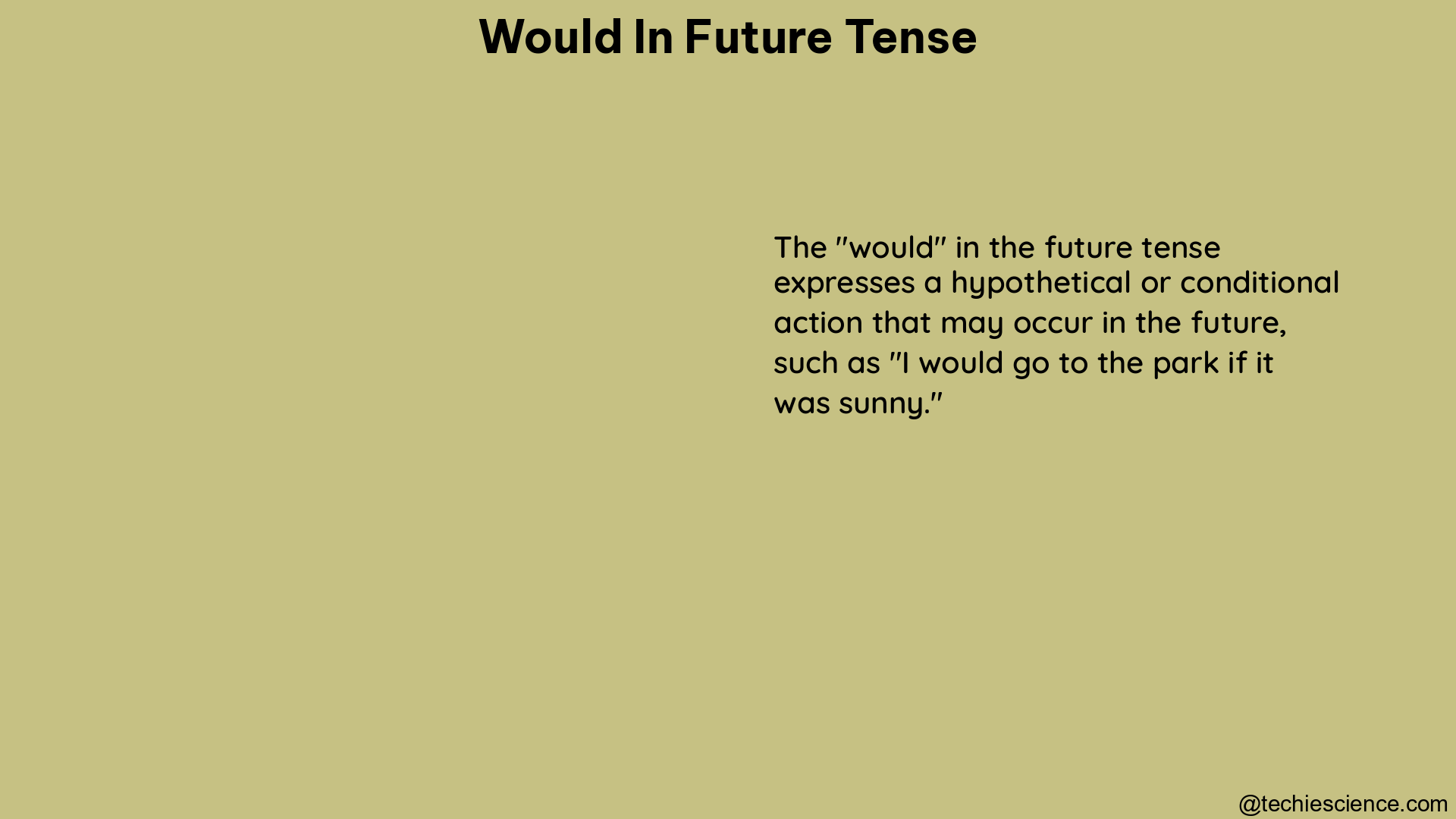The use of “would” in the future tense is a crucial aspect of English grammar, as it allows us to express hypothetical situations, make polite requests, and discuss future actions from a past perspective. In this comprehensive guide, we will delve into the intricacies of using “would” in the future tense, providing you with a detailed understanding of its various applications and examples.
Hypothetical Situations
One of the primary uses of “would” in the future tense is to express hypothetical or unreal situations that may occur in the future. This is particularly useful when discussing scenarios that are unlikely to happen or when considering alternative possibilities.
Imagining Unlikely Scenarios
When discussing hypothetical situations that are unlikely to occur, “would” is used to express what the outcome would be if the situation were to happen. For example:
- If I won the lottery, I would buy a house on the beach.
- If it were to rain, the crops would grow faster.
- If I were you, I would not do that.
- If it were possible, I would travel to Mars.
In these examples, the use of “would” indicates that the described actions are hypothetical and not necessarily based on reality.
Conditional Statements
“Would” is also used in conditional statements to express a hypothetical future outcome. These statements typically begin with “if” and describe a condition that, if met, would result in a specific consequence.
- If I had the money, I would buy a new car.
- If she studied harder, she would pass the exam.
- If I had the time, I would learn to play the guitar.
- If it were to snow, we would go skiing.
In these examples, the use of “would” in the second part of the conditional statement indicates the hypothetical future outcome that would occur if the condition in the first part of the statement were met.
Polite Requests and Invitations

Another common use of “would” in the future tense is to make polite requests and invitations. By using “would” instead of “will,” the speaker conveys a more courteous and less demanding tone.
Polite Requests
When making requests, using “would” can help soften the tone and make the request more polite and considerate.
- Would you like another cup of coffee?
- Would you mind passing the salt?
- Would you be able to help me with this task?
- Would it be possible for you to attend the meeting?
In these examples, the use of “would” makes the requests more polite and less demanding, allowing the listener to feel more comfortable responding.
Polite Invitations
Similarly, “would” can be used to extend polite invitations, making the invitation sound more considerate and less presumptuous.
- Would you like to join us for dinner?
- Would you be interested in attending the concert with me?
- Would you care to come over for a cup of tea?
- Would you be available to meet for lunch on Friday?
By using “would” in these invitations, the speaker conveys a sense of consideration for the listener’s preferences and schedule, making the invitation more welcoming and less imposing.
Future in the Past
The use of “would” in the future tense can also be used to express a future action from a past perspective. This is known as the “future in the past” and is used to describe what was expected or anticipated to happen in the future, from the vantage point of the past.
Describing Anticipated Future Actions
When discussing future actions from a past perspective, “would” is used to indicate what was expected or believed to happen in the future.
- I knew you would help me.
- She thought you would like the gift.
- He expected that the team would win the game.
- We assumed the weather would be sunny for the picnic.
In these examples, the use of “would” indicates that the described actions were anticipated or expected to occur in the future, from the perspective of the past.
Expressing Beliefs and Predictions
“Would” can also be used to express beliefs or predictions about the future, from the vantage point of the past.
- I believed the new restaurant would be a success.
- She was certain the project would be completed on time.
- They thought the stock prices would continue to rise.
- The experts predicted the economy would recover by the end of the year.
In these cases, the use of “would” conveys the speaker’s past beliefs or predictions about the future, rather than describing a specific future action.
Conclusion
The use of “would” in the future tense is a versatile and essential aspect of English grammar. By understanding its various applications, including expressing hypothetical situations, making polite requests and invitations, and discussing future actions from a past perspective, you can effectively communicate your thoughts, beliefs, and expectations about the future.
Remember, the key to mastering the use of “would” in the future tense is to practice using it in different contexts and to pay attention to how it is used in your daily conversations and written communication. With time and practice, you will become more comfortable and confident in your ability to use “would” to convey your intended meaning.
Reference:
- https://www.thesaurus.com/e/grammar/will-vs-would/
- https://learnenglish.britishcouncil.org/grammar/english-grammar-reference/will-would
- https://www.youtube.com/watch?v=L15InYW9sRk
Hi… I am Sowndharya Jagadeeswaran, a university rank holder in M.A. English Literature. I have also done my master’s in Business Administration. Inquisitive as I am, my interest in action-oriented research helped me publish research papers in reputed journals. Now, as a career, I am an instructor where I teach young and adorable students the intricate technicalities of Public Speaking and Creative Writing. I also enjoy writing articles on topics I specialize and research in.
You can connect with me through LinkedIn.-